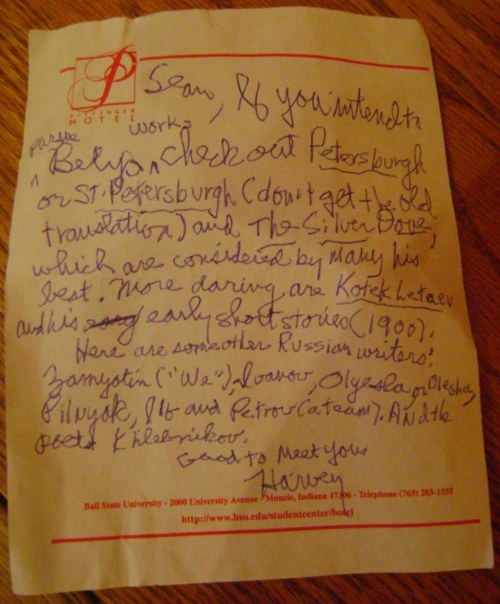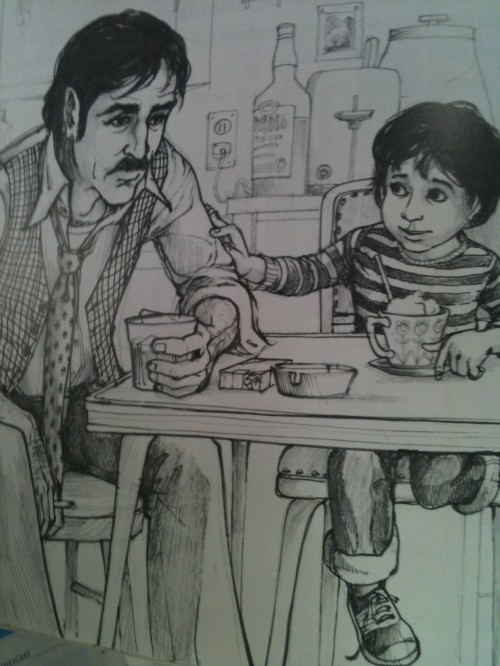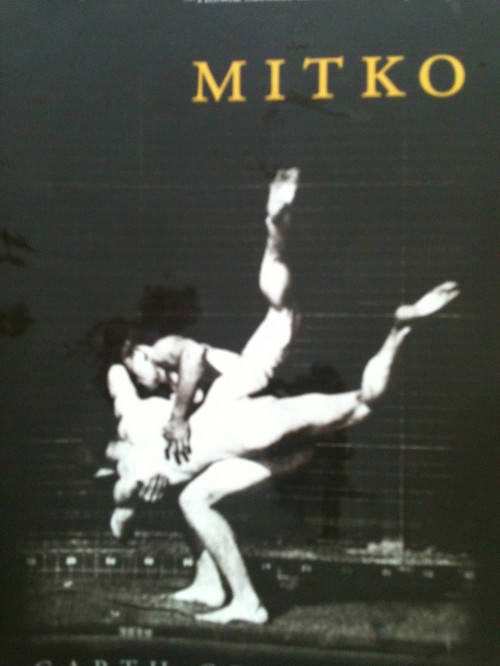‘If you intend to pursue work’ by Harvey Pekar
A while back some of you were asking about Russian authors. Then yesterday I found a note on a shelf in my Man Room. It made me wistful and sad. It was from a genius and gracious man, Harvey Pekar. We had dinner a couple years ago. (He had onion rings, I had veggie nachos—neither of us eat meat in restaurants.) He talked jazz. I talked bow hunting. Then we discussed Russian authors. The next day Mr. Pekar walked into my office and handed me this exact note:
Here’s what I think it says, though maybe you could help. I couldn’t find some of these Russians, or figure out what exactly to look for, but possibly I just couldn’t decipher Mr. Pekar’s handwriting. Any help would be appreciated. (I found Andrey Bely and Khlebnikov–I mean the others.) I respect Mr. Pekar’s opinion, and following up on these authors would help us all who love Russian lit.
Sean, If you intend to pursue work, Belyo, check out Petersburgh or St. Petersburgh (don’t get the old translation) and The Silver Dove, which are considered by many his best. More daring are Kotekhetaev and his eary early short stories (1900).
Here are some other Russian writers: zamyotin (“We”), Ivanov, Olyesla or Olesha, Pilnyok, Ilb and Petrov (a team). And the poets Khlenikov.
Good to meet you
Harvey
* Update: just figured out IlF and Petrov.
6 Books: Maggie Nelson on Nonfiction
 This is Part III in a series where I ask writers I like for 6 book recommendations according to some loose guideline. Part I is here; Part II is here. This week is another installment on nonfiction, this time brought to us by Maggie Nelson, author of Bluets (Wave Books), the forthcoming The Art of Cruelty: A Reckoning (Norton), and five other books of poetry, criticism, and essay.
This is Part III in a series where I ask writers I like for 6 book recommendations according to some loose guideline. Part I is here; Part II is here. This week is another installment on nonfiction, this time brought to us by Maggie Nelson, author of Bluets (Wave Books), the forthcoming The Art of Cruelty: A Reckoning (Norton), and five other books of poetry, criticism, and essay.3 teensy reviews
Tight Times is a children’s book about a kid who wants a dog. His mom says don’t talk to her because she is busy. She wears a bra around the house. The family makes the kid eat a cereal called MR. BULK. Dad gets laid off and comes home and smokes a cigarette and makes a stiff drink. Mom tells the kid to stay outside. Kid finds a cat in a garbage can. Some nosy aging hipster woman stranger says he should just keep the cat. Parents say, fine, OK, keep the damn cat. Kid does so and names it Dog. Kid feeds Dog lima beans.
Vivisection is the controversial act of operating on a living animal. People have performed vivisection on humans, primarily as some demented form of medical “experimentation” or as torture. Anesthesia usually not applied during these surgeries. The term is also the title of a poetry chapbook by Eric Weinstein, winner of the 2010 New Michigan Press chapbook contest.
Today & Tomorrow Today
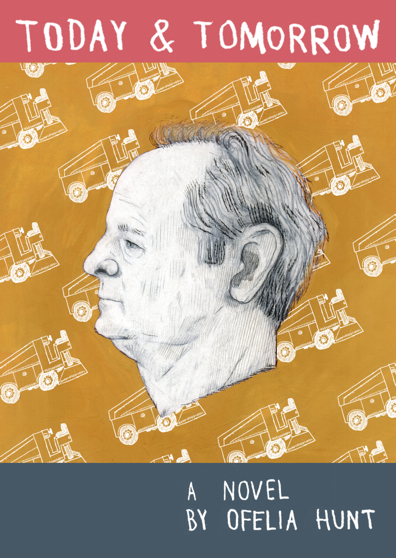
Here. Now. Today. Ofelia Hunt‘s Today & Tomorrow. I read it and liked it very much. (No surprise. No offense meant to any of the other wonderful books from Bear Parade, but My Eventual Bloodless Coup is the site’s monster.)
Today is her birthday. Her sisters are Merna and Anastasia, who once told her it was good luck to touch all doorknobs. Her boyfriends are Aaron, whom she just met, and Erik, whose name is actually Todd. Her grandfather worked in a tin can factory. Now he bakes blueberry pies and laughs and says it’s all true. In the Carlsbad Caverns, Bill Murray wields a giant robot, swallowing families. Today is in Wal-Mart, in Denny’s, at the ice rink. Tomorrow there will be blood on the zamboni. Tomorrow there will be a voice that locks the door behind her. Set among haunted parking lots and AM-PMs and home invasions, Today & Tomorrow melts identity, memory, and consciousness into a hypnotic and hilarious adventure of body and mind, the haunting absurdity of what it means to be a person that can make up everything but itself.
“This book would like to give you an ice cream, but you will have to get in the van.” — Amelia Gray, author of Museum of the Weird
Suggested Pairings: Garth Greenwell and Harry Porter and the Bourbon Soaked Vanilla Beans Porter
You are in Bulgaria. You are a teacher. You are an American man seeking to meet men. To meet them in a certain type of bathroom, “…a chill room with its impression of damp…” “…having a single purpose only, any other use of them accidental.” You meet a young, homeless Bulgarian, Mitko. He tries to sell you drugs. You don’t want drugs, you want sex. So he sells you sex. A transaction. But you want to take this transaction further. Most would not—it’s a crazy idea, to confuse this form of transaction with something deeper. Unless you are torn, to the own self. Your wants, motives, and mind. Well. Here we go. And so it begins.
As you surmised, I’m a drug dealer. Example: Yesterday, a young man pedaled over to my house to trade beer for drugs. I gave him 75 tablets of ibuprofen, four packets of raw sugar, and 2.6 pounds of Starbucks Coffee House Blend Melange Maison. He loaded these into his bicycle basket and passed me a six pack of Harry Porter and the Bourbon Soaked Vanilla Beans Porter (Great Lakes Brewery). Dork. But I will say the beer pours a dark cedar with a spare diminishing marshmallowy light-auburn head.
Books by people named Garth. I rarely read them.
6 Books: Kevin Sampsell on Nonfiction
 This is Part II of a series where I ask writers I like for 6 book recommendations according to some loose guideline. Part I is here. This week, Kevin Sampsell, editor of Future Tense Books out of Portland, Oregon, doyen of Powell’s Books, and author of the wildly excellent memoir, A Common Pornography (Harper Perennial). To give you an idea of the goodness of Kevin’s book, I’ll confess that the first copy I had didn’t make it through my ravenous reading of it and I had to switch to another.
This is Part II of a series where I ask writers I like for 6 book recommendations according to some loose guideline. Part I is here. This week, Kevin Sampsell, editor of Future Tense Books out of Portland, Oregon, doyen of Powell’s Books, and author of the wildly excellent memoir, A Common Pornography (Harper Perennial). To give you an idea of the goodness of Kevin’s book, I’ll confess that the first copy I had didn’t make it through my ravenous reading of it and I had to switch to another.
I asked Kevin to recommend 6 nonfiction books, old or new. He obliged, and then some:
Black Box: Cockpit Voice Recorder Accounts of In-Flight Accidents by Malcolm MacPherson
I’m fascinated with this book and the way these transcripts reflect the collected calm of airplane pilots and then their sudden confusion, panic, and tragedy. An eerie and morose reading experience.
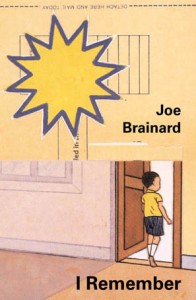 I Remember by Joe Brainard
I Remember by Joe Brainard
Whenever I go talk to a writing class about memoir, I always point out this book and read a little from it. Then I have the class write a few of their own “I Remembers.” It’s such a non-threatening and easy way to access parts of your life that you think are uninteresting and trivial, but turn out to be engaging and universal.
Time Out of Mind by Leonard Michaels
Besides his fiction and his essays, this book is a bit of an oddity because it’s more like disjointed journal entries. It took me a few pages to lock into Michaels’s groove, but once I did, this book turned into a thing of uncut beauty. I would have to say that Leonard Michaels is the author I’ve been most obsessed with for the past year since I read his novel, The Men’s Club.
Oedipus Wrecked by Kevin Keck
This book is so dirty and hilarious, but also sweetly heartfelt. For fans of Jonathan Ames and other straight-faced pervs.
It’s Weird That People Think That That’s Weird: An Interview with Jamie Iredell
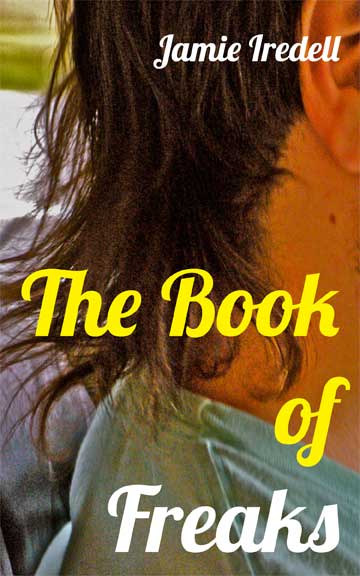 Earlier this year saw the release of Jamie Iredell’s second book, The Book of Freaks, from Future Tense Press, on the heels of his much beloved Prose: Poetry, A Novel. Essentially an encyclopedia-style catalog of human oddities and the author’s wild ruminations on everything from Russians to People Named Spencer and Their Wives, the whole assemblage works as a collage you can dip in and out of with immediate pleasure, but also manages to construct among its pieces a hybrid narrative that is truly singularly Iredellian. Over the past several weeks, Jamie was kind enough to take some time to talk about some of the manners of the book with me via email.
Earlier this year saw the release of Jamie Iredell’s second book, The Book of Freaks, from Future Tense Press, on the heels of his much beloved Prose: Poetry, A Novel. Essentially an encyclopedia-style catalog of human oddities and the author’s wild ruminations on everything from Russians to People Named Spencer and Their Wives, the whole assemblage works as a collage you can dip in and out of with immediate pleasure, but also manages to construct among its pieces a hybrid narrative that is truly singularly Iredellian. Over the past several weeks, Jamie was kind enough to take some time to talk about some of the manners of the book with me via email.
– – –
BB: Having published your first book that was largely autobiographical, but in some ways also a book full of freaks, how did you end beginning work on an actual, encyclopedia-styled Book of Freaks?
JI: I don’t know. I didn’t really think about it at all, in that I wasn’t thinking “I’m writing a book.” I was just writing shit mostly in the Notes App on my iPhone. Basically talking shit. When I thought something was funny or fucked or whatever, I’d write about it, and then in rewriting I’d make it better. Eventually I saw themes developing. I caught a bunch of these A&E shows about obese people, or folks with other debilitating conditions, like this woman with one part of her body (legs) growing out of control her entire life, so her legs were all fucked up huge while the rest of her was normal. Then I figured, if there’s something interesting about those people then there’s something equally interesting about Mexicans, or people who purposely style their hair into fauxhawks.
21 bottled ducks
1.
21.
httpv://www.youtube.com/watch?v=LSnp9rYb7zE
4. The first issue of Stoked is here! Amber Sparks, Brian Oliu, Daniel Bailey, J.A. Tyler, Mike Young, Ryan Ridge, and Sarah Carson, as well as reprinting of stories by Roxane Gay (originally published in Gargoyle 56) and Matt Bell (originally in Drexel Online Journal). Hey now!
22. The number played in roulette, Casablanca.
14. LSU Press drops a new Hemingway craft book.
Art Matters shows exactly how Hemingway’s craft functions and argues persuasively for the importance of studies of articulated technique to any meaningful understanding of fiction and literary history.
I have the urge to read this book. And also to vomit. I might go ahead and do both.
Twitter MFA
In which we do a close-reading of a Tweeter’s Tweet draft and assess its tone, theme, synecdoche and narrative arc, among other things. Today’s Tweet draft was written by Colson Whitehead. Join us in two weeks for a discussion of a Tweet draft written by Drew Kalbach.
The Tweet draft:
This is one in a series of linked tweets about a small West Virginia mining town. Revolving narrators, characters in common, bittersweet.
It is not this Tweet draft alone that awes us, but the notion that Whitehead is mining the depths of his past in order to present to us a courageous work of Tweet. Whitehead, who hails from the small town of Manhattan, West Virginia, located in the Eastern Panhandle, is a Tweeter most capable of pulling off such a masterful rendition of the linked genre: the story-in-Tweets, an updating of the classic novel-in-stories genre we have seen so successfully employed by writers since Sherwood Anderson. Of Whitehead’s ambitious project, Hart Crane, who also has a highly visible social media presence, recently Tweeted: “@America should read @colsonwhitehead’s Tweets on her knees. They are an important update in the feed of her consciousness.” (Of course, it should be noted that this is Crane’s transparent ploy to get retweets from both Whitehead and America.)
Elliot Feels His Feelings: an interview with Michael Kimball

Michael Kimball is now the author of three of my favorite books. Before I read his latest, US, I had read and loved THE WAY THE FAMILY GOT AWAY. Before I read US, I read and really, really loved DEAR EVERYBODY. And before I read US, I had purchased but had not yet gotten to HOW MUCH OF US THERE WAS.
Now there’s US: disarmingly simple, gorgeously structured, and as achingly sad a book as I have ever read. I had to stop a couple of times. I really did. The book’s elderly couple—so painfully aware of the fact that one of them is living the last parts of her life—are drawn so concisely, and the situation is so precisely rendered, it was hard not to spend all my time living in it even when I wasn’t reading the book.
Michael and I talked about DEAR EVERYBODY when it came out. When US appeared, we thought it might be nice to talk again.
***
Started your book last night. You are going to break my heart again, aren’t you?
Yes, but in a different way.
Why do our hearts have to break in so many different ways?
It’s one of the surprising things about life, right? When we learn that that can happen.
Or,
I think that it’s partly a structural issue, the heart’s strange shape. READ MORE >

